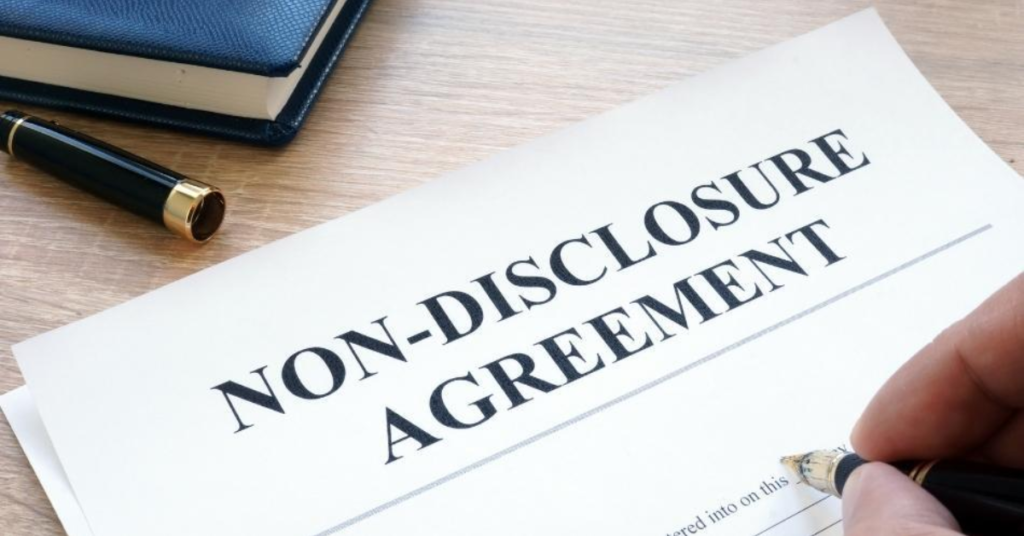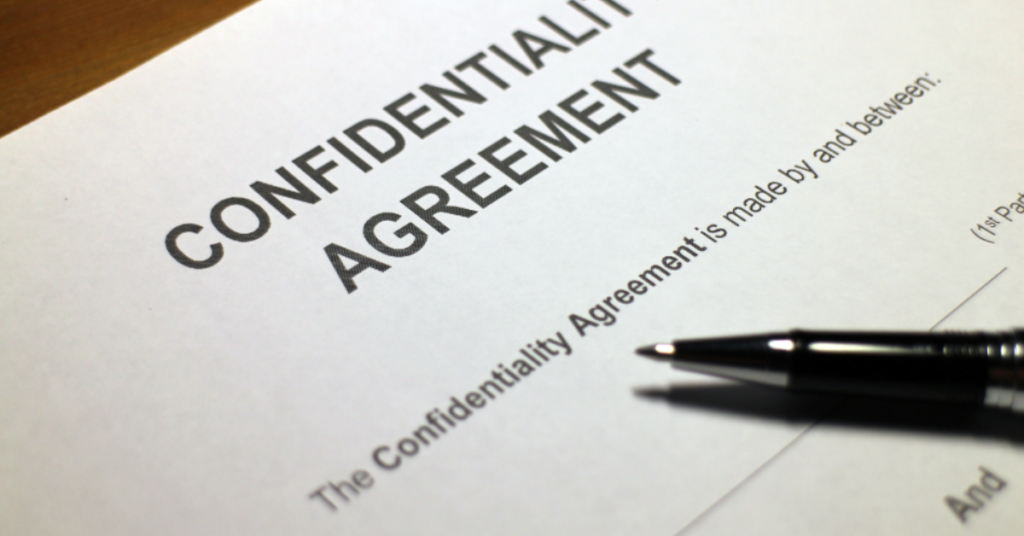Protect your business before, during, and after a sale.

Deciding to sell a successful business you’ve spent years building is a significant milestone: you’re ready to let go of the day-to-day operations and enjoy the fruits of your labor.
But before selling your business, you must protect your proprietary information by ensuring it stays confidential and limiting who gains access to that information. Having competitors, vendors, and employees discover a potential sale too early or gain access to information they shouldn’t have could disrupt your deal.
That’s where a confidentiality agreement, also known as a non-disclosure agreement (NDA), for the sale of a business comes in to protect your interests through the entire process. An NDA allows you to provide information to potential buyers without fear that they will share information about the sale or your business operations to other individuals or companies.
What Is a Business Sale Confidentiality Agreement (NDA)?
Potentially as important as a business purchase agreement, a confidentiality agreement is a key document when selling a business. It ensures the security of any private details related to the sale or operations of your business and protects your personal information.
Business brokers and potential buyers need access to confidential business information when evaluating a business. An NDA allows these parties to have access to the necessary confidential information but limits what they may do with that information. Interested buyers can’t share details, proprietary data, or even that the business is for sale with the public or internal stakeholders like employees, vendors, and competitors. The broker will use this information to assist with the sale process and accurately represent your company during negotiations with potential buyers.
Confidentiality for All Parties
Buyer-seller confidentiality agreement clauses should protect both parties when preparing an NDA for a business sale. To make an informed decision, the seller should properly vet the potential buyer before closing the deal. They might consider whether or not the buyer is a good fit and has the financial ability to buy the business.
Further, the buyer is responsible for independently verifying the claims and information provided by the seller and needs to conduct due diligence on the business to determine its value.
The Importance of Confidentiality Agreements
Confidentiality agreements originated due to business and legal scenarios where the sharing or leaking of information by one party involved was detrimental to the other. A common example of a confidentiality agreement is an NDA signed by prospective employees before they interview and tour an employer’s campus. Although business sale confidentiality agreements are typically two-way, meaning both parties are sharing confidential information, a one-way agreement is appropriate in cases where only one party has concerns about information secrecy.
Confidentiality agreements during the sale of a business serve an important purpose by giving both the buyer and seller assurance that their information will be kept private, which allows for much more open and transparent negotiations. Additional purposes served by confidentiality agreements include:
● Safeguarding the reputations of the buyer and seller
● Maintaining compliance with regulatory requirements and privacy laws
● Reassuring employees, vendors, and customers that their information will not be disclosed to prospective buyers during the process
● Preserving competitive advantage by ensuring IP and trade secrets are not mishandled
Scenarios Where Confidentiality Agreements Are Crucial
In some cases where two companies or parties are quite familiar with one another or only intend to share a very limited amount of information (such as an entry-level job interview), an NDA can become little more than a formality. However, during the sale of a business, a confidentiality agreement is an absolute necessity. Additional business scenarios where confidentiality agreements are crucial include:
● Licensing of technology to other companies
● Hiring consultants to audit or improve business practices
● Outsourcing work to other companies
● C-level executive recruitment
Which Information Is Confidential?
Involving a lawyer can be critical when determining which information to cover with a buyer-seller confidentiality agreement. Often included are:
● Financial figures – profit & loss statements, cash flow, and balance sheets
● Trade secrets
● Revenue streams
● Business strategies and long-term plans
● Employee lists with contact information
You should also determine how long the NDA is in effect. Typically, regardless of the outcome of the potential sale, neither side can legally discuss any of the information covered by the NDA for a year or more. Your lawyer should also help you determine who will have access to information, from buyers, advisers, and business brokers to lawyers and consultants.

How to Prepare a Business Sale Confidentiality Agreement
Confidentiality agreements are usually pretty standard but can be made more specific, depending on how much access to sensitive material each party needs.
What Does a Non-Disclosure Agreement Cover?
A business sale confidentiality agreement covers all information you want to keep secret during negotiations and aims to keep the seller’s confidential information private during due diligence and potentially after the sale as well. It’s important because the buyer needs to know specific details about your business before they can decide if they want to buy it or not and for what price.
Items such as how your company makes money, how much profit it makes, and its customer information can all greatly influence the sale price of your business. The agreement will define exactly what is and isn’t confidential information and how long information must remain confidential. Typically, the NDA will include:
● The name and location of the business
● Financial statements and KPIs
● Information about intellectual property (IP)
● Salaries
● Marketing strategy
● Revenue streams
● Customer lists
● Ownership information
● Other information that could harm your business if it were public knowledge
In addition to detailing the scope of information that must remain confidential, NDAs typically include an obligation of confidentiality, which provides more specifics of how the information in scope is to be handled. For example, if the seller provides business plans and forecasts for review, they may stipulate that the files must be deleted within a specified time frame. The agreement might also include a list of exceptions, where the obligation of confidentiality does not apply.
Key Elements and Clauses of Standard Confidentiality Agreements
There are a few key elements and clauses that should always be included in the confidentiality agreement to preserve your best interests.
Use restrictions define how shared information can (and cannot) be handled, while duration clauses place strict time limits on confidentiality for each type of information. In some cases, shared information such as IP must be kept confidential indefinitely. Severability clauses are also important, since they list conditions under which the agreement becomes invalid, while indemnification clauses define the financial consequences associated with a breach.
Here are some additional elements to consider when drafting a confidentiality agreement for the sale of a business:
● Restrictions that involved parties can’t further divulge any information shared during the transaction without express permission, including that the business is for sale. Applicable not only to financial information but also to anything else that could give an advantage to other potential buyers or employees, customers, suppliers, and third parties.
● All records must be destroyed or returned without making any copies. This clause helps prevent compromise of proprietary information and trade secrets, information theft, or accidental disclosure to clients or suppliers. Records or documents typically may not leave the premises reserved for the due diligence phase if conducted in person.
● Contact with employees, customers, and suppliers is also not permitted unless all parties agree in writing.

Tips for Drafting Effective Confidentiality Agreements
Reviewing the relevant elements, clauses, and scope you want to include in a confidentiality agreement is a good place to start. You should also have a firm grasp of the risks and specifics associated with the business transaction covered before you begin the writing process. This homework will make it easier to convey the information you need to protect and define the obligations of each party. Additional tips to keep in mind when drafting a concise business sale NDA include:
● Creating a detailed and comprehensive list of relevant information types
● Minimizing unnecessary or ambiguous language and clauses
● Keeping the terms realistic and avoiding hypotheticals
● Ensuring the governing law and jurisdiction are defined
Confidentiality agreements might seem straightforward, but the serious implications make it essential to produce a well-written, legally binding document. Consider seeking legal advice any time you need to create, review, or revise the agreement.
Legal Implications of Confidentiality Agreements
First and foremost, a confidentiality agreement is a legally binding contract that should be carefully read and understood before it is signed. Given the potential consequences of a breach, it is important to remember that wrongly disclosed information can never be “undisclosed.” While proving a breach of confidentiality can be difficult, the financial fallout can be severe for both parties.
Enforceability is a key legal concept for confidentiality agreements, since initiating and signing an agreement is easier than seeking damages in court. In general, a confidentiality agreement that is properly signed, executed in the same state as the business activities were performed, and does not conceal any illegal activities is considered enforceable. Detailed agreements make it easier to discern between intentional breaches from unintended errors.
In conclusion
Confidentiality agreements help to safeguard business interests and trust in professional relationships during sensitive transactions like the sale of a business. By clearly establishing the scope of confidential information, specifying the obligations of each party, and outlining the consequences of a breach, you can leverage the NDA to protect confidential information, preserve your competitive advantage, and ensure a fair negotiation process. Important legal aspects of the NDA should be kept in mind as you create a clear, concise, and enforceable agreement with the help and advice of legal professionals.
Key NDA Questions
There might be a lot involved in a confidentiality agreement. Here are some key questions you might ask before signing an NDA:
What does a non-disclosure agreement look like?
A non-disclosure agreement is a fairly standard legal contract that says you won’t share information about the other party’s business with anyone else, including your employees.
Does a Buyer Have to Sign a Confidentiality Agreement?
It may not be required, but serious buyers do. The seller will likely not provide a potential buyer with much information without a signed agreement. Those who won’t sign NDAs will struggle to be considered a genuine buyer and will likely be avoided by the seller. Without signing, there’s no incentive to keep the information confidential, and a seller would be unlikely to provide access to essential business details.
What Can Happen If You Don’t Use an NDA?
Suppose you don’t have a signed NDA, and a competitor with no intention of purchasing your business gains access to your confidential information. They could use this information to strengthen their own business by targeting your specific customers, undercutting your price, hiring your employees, copying your products, or even attempting to disrupt your future growth plans. Without an NDA in place, you have no legal protections. With a signed confidentiality agreement, you would have significant legal standing and be able to pursue damages against the competitor for violating the terms of the agreement.
How Can I Get Someone to Sign a Confidentiality Agreement?
The easiest way to get someone to sign an NDA is to require a signature before disclosing confidential information. Even if there is an expectation of confidentiality already in place due to the nature of your prior business dealings, having a counterparty sign before receiving the additional confidential information may be beneficial. This will help protect you against later claims that they didn’t know the information was confidential.
Does an NDA Cover Negotiations?
Confidentiality agreements are a standard part of any negotiation, especially when dealing with proprietary or confidential information. They allow you to discuss sensitive information without worrying about what will happen with it once negotiations have finished (or failed).
Once all parties agree on terms and conditions, they must sign the business purchase confidentiality agreement. That way, the terms of the agreement are legally binding and both parties have acknowledged what is and is not confidential information.
3 Common Mistakes When Selling a Business
Selling a business can be a complex process, and mistakes can happen. Most of those errors result from a lack of forethought and planning.
1. Forgetting to Plan an Exit Strategy
Many successful entrepreneurs are great at running their business but overlook their exit strategy. They get busy running their company and don’t realize that the right time to sell may come quickly. Knowing what you want from your business and keeping your eye on the ball when finding a buyer is essential.
2. Not Knowing the Business’s Market Value
Your company’s value is one of the most impactful considerations when selling your business; not getting an accurate valuation is another common mistake. Pricing your business too low might cause you to miss out on opportunities. But if you price it too high, you might scare away qualified buyers.
Find someone who understands your industry well enough to make an informed decision about how much your company could bring in during a sale. They’ll then use this figure as a starting point for negotiations with prospective buyers.
3. Skipping a Business Sale Confidentiality Agreement
You must protect yourself and your company when you plan to sell your business. A confidentiality agreement can ensure that all your confidential information stays safe and that both parties’ interests are protected.
It’s wise to have a standard non-disclosure agreement before you begin shopping around for potential buyers or investors to protect sensitive information you might share during negotiations.